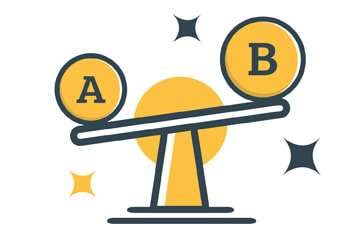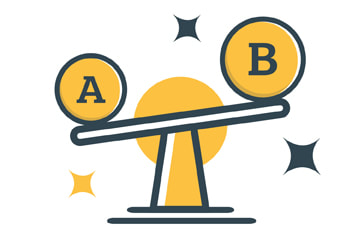Car Loan Brokers vs Car Finance Companies
Our guide explains the differences between Car Loan Brokers and Car Finance Companies (also known as Direct Car Lenders), the pros and cons of each and what you need to know to get the best deal if you're borrowing to buy a car.
Updated 8 November 2023
Summary
MoneyHub is committed to ensuring everyone looking for a loan compares their options carefully. A car loan is likely to be your most expensive debt after a mortgage - getting the best price is essential.
Our comparison of brokers and direct lenders has been published to ensure you understand everything to get the best possible deal, ensure your long-term financial health, manage the risks, and potentially save thousands of dollars over the loan term. We cover:
Know This First: How do brokers and direct lenders work in practice?
This is best explained with two examples:
- Car loans are usually arranged via a broker or with a lender directly, although many people don't know that their lender is, in fact, a broker.
- Car Loan Brokers are intermediaries connecting potential borrowers with various lenders. Their role is to assist borrowers in finding the best loan terms based on individual financial situations. Examples include Simplify, Better Finance and Kiwi Car Loans, among others.
- Direct Car Lenders, on the other hand, are financial institutions that provide loans without any intermediaries involved. This could range from specialist lenders and banks to dedicated car financing companies. Examples include MTF Finance, Harmoney and AA Money.
MoneyHub is committed to ensuring everyone looking for a loan compares their options carefully. A car loan is likely to be your most expensive debt after a mortgage - getting the best price is essential.
Our comparison of brokers and direct lenders has been published to ensure you understand everything to get the best possible deal, ensure your long-term financial health, manage the risks, and potentially save thousands of dollars over the loan term. We cover:
- Understanding Car Loan Brokers and their Pros & Cons
- Understanding Direct Car Lenders and their Pros & Cons
- The Key Differences Between Car Loan Brokers and Direct Lenders
- Frequently Asked Questions
- Car Loan Glossary
- Checklist for Choosing Between a Broker and a Direct Lender
- Our Conclusion
Know This First: How do brokers and direct lenders work in practice?
This is best explained with two examples:
- Matt, a first-time car buyer, wanted to finance a car but didn't know where to start. He decided to approach a car loan broker to explore multiple options. Within two days, the broker presented Matt with offers from three different lenders, each with varying interest rates, terms, and conditions. With the broker's guidance, Matt chose the loan offer with the lowest interest rate offer. Matt saved time applying for using a broker.
- Sarah wanted a car loan, so she approached her bank directly. She was promptly offered a car loan at a discounted interest rate for being a long-standing (and reliable) customer, something that she wouldn't have received if she'd gone through a broker. However, without comparing the market, there's no way to be certain the bank's offer was the best for Sarah.
MoneyHub Founder Christopher Walsh shares his comments about using Car Loan Brokers vs going direct to a specialist car finance company:"When choosing between a car loan broker and a direct car lender, it's essential to remember that it's not just about the rate (although that will determine the total borrowing cost). It's about finding a solution tailored to your needs and financial situation - too many New Zealanders rush into car finance and don't have the experience to get the best deal. Car finance can be financially crippling if you get wrong".
"Loan brokers and direct lenders have unique value propositions, and what's best for one borrower might not be best for another. Brokers connect you to multiple lenders but going directly to a car finance company can simplify the process and potentially offer exclusive perks". "However, whatever you choose, trust is paramount when securing a loan. Ensure that whether you're working with a broker or a direct lender, they have your best interests at heart". |
Christopher Walsh
MoneyHub Founder |
Understanding Car Loan Brokers and their Pros & Cons
Know This First: What are car loan brokers?
Car loan brokers act as a bridge between borrowers and lenders. They're like consultants, aiding consumers in finding the most suitable car loan based on the consumer's financial position, needs, and preferences.
How do they operate?
Brokers work by first assessing the borrower's financial situation and needs. With this information, they scan their network of affiliated lenders, seeking out those most likely to approve the application and offer favourable terms. Many brokers also assist with the application process and support you until the loan is approved.
Pros of Using Car Loan Brokers:
Cons of Using Car Loan Brokers
Car loan brokers act as a bridge between borrowers and lenders. They're like consultants, aiding consumers in finding the most suitable car loan based on the consumer's financial position, needs, and preferences.
How do they operate?
Brokers work by first assessing the borrower's financial situation and needs. With this information, they scan their network of affiliated lenders, seeking out those most likely to approve the application and offer favourable terms. Many brokers also assist with the application process and support you until the loan is approved.
Pros of Using Car Loan Brokers:
- Variety of Options: New Zealand's financial market has many lenders, each with unique offerings. With their wide-ranging networks, brokers can quickly tap into multiple sources, giving borrowers numerous choices. This ensures borrowers don't miss out on potential deals they might not have found on their own and avoid overpaying by being able to compare broker deals with direct deals they've applied for on their own.
- Time-saving: The task of researching, contacting, and comparing terms from multiple lenders can be daunting. Brokers simplify this by doing all the groundwork. They use their experience and systems to quickly identify potential fits, making the car buying process more efficient.
- Potentially Better Rates: Given their volume of business and industry relationships, brokers sometimes have the leverage to negotiate better terms or access rates that aren't available to the general public. This could result in significant savings over the life of the loan.
- Expertise: The car loan landscape can be complex. Brokers who operate in this space daily possess insights about industry trends, potential pitfalls, and the nuances of different lenders. They can provide tailored advice, ensuring borrowers make informed decisions.
Cons of Using Car Loan Brokers
- Broker Fees: While some brokers earn revenue through lender commissions, others might charge a fee for their services. If not offset by savings from the loan terms, this cost could make the loan more expensive if passed on to you, the borrower. If in doubt or it's unclear how the broker will be paid, ask how they'll be paid upfront before going further.
- Potential Bias: Not all brokers operate with complete transparency. Higher commissions offered by particular lenders might sway some. This could lead to scenarios where the broker recommends a loan not because it's the best fit for the borrower but because it's the most profitable for them.
- Limitations: Despite their extensive networks, brokers don't have ties with all available lenders. Some financial institutions prefer to work directly with consumers. Consequently, by exclusively using a broker, you can miss out on some unique offerings.
Understanding Direct Car Lenders and their Pros & Cons
Know This First: What are direct car lenders?
Direct car lenders are companies that lend money directly to consumers without the mediation of any third-party brokers or intermediaries. These lenders can be traditional banks, credit unions, or other financial establishments specialising solely in car loans.
How do they operate in New Zealand?
Direct car lenders can have online platforms and physical branches where potential borrowers can apply for loans. An example is MTF Finance, with 50+ branches around New Zealand. Typically, borrowers approach the lender, submit the necessary documents (proof of income, credit history, bank statements, etc.), and upon approval, the lender provides terms and conditions tailored to the borrower's financial profile.
Most banks and credit unions have dedicated car finance offers, as do online lenders such as Harmoney and AA Money.
Pros of Going Direct:
Cons of Going Direct:
Know This: Both options come with their unique sets of benefits and drawbacks. What's best will depend on your preferences, the time you are willing to invest and your comfort level in negotiating and understanding financial terms. Always remember to factor in the full cost of borrowing, including establishment fees and monthly charges, to ensure you make the best financial decision for your circumstances. What's important is the total cost of the loan - if you're repaying $15,000 for a $12,000 loan, that, for example, is a better deal than paying $17,000 - compare the market and don't rush into anything and make sure the broker, lender or anyone you get a quote from gives you the total cost of the loan.
Direct car lenders are companies that lend money directly to consumers without the mediation of any third-party brokers or intermediaries. These lenders can be traditional banks, credit unions, or other financial establishments specialising solely in car loans.
How do they operate in New Zealand?
Direct car lenders can have online platforms and physical branches where potential borrowers can apply for loans. An example is MTF Finance, with 50+ branches around New Zealand. Typically, borrowers approach the lender, submit the necessary documents (proof of income, credit history, bank statements, etc.), and upon approval, the lender provides terms and conditions tailored to the borrower's financial profile.
Most banks and credit unions have dedicated car finance offers, as do online lenders such as Harmoney and AA Money.
Pros of Going Direct:
- No Middleman: Without brokers involved, borrowers often have a clearer line of communication with the lender. This direct relationship can sometimes facilitate a smoother application process and ensure no hidden costs or broker fees.
- Direct Communication: Borrowers can get firsthand information from the source, ensuring clarity. This means any questions, concerns, or negotiation points can be addressed promptly without going through an intermediary.
- Exclusive Offers: Some lenders reserve special deals or promotional rates for customers who approach them directly, seeing it as a reward for customer loyalty or a tactic to compete against broker-associated lenders.
- Potential for Relationship Banking: When you approach a bank where you already have an account or relationship, you might get preferential treatment or offers. This relationship banking can also pave the way for future deals on other banking products.
Cons of Going Direct:
- Time-Consuming: One of the primary drawbacks of going directly to lenders is the time investment. If you're shopping around for the best deal, you'll need to approach each lender separately, fill out multiple applications, and compare the terms and offers on your own.
- Limited Scope: Unlike brokers who can provide options from multiple lenders at once, with direct lending, you get offerings from just one lender at a time. This can limit your perspective and potentially cause you to miss out on a better deal elsewhere - you'll need to compare lenders side by side by getting custom offers, as outlined in our car finance comparison.
- Potential Complexity: Brokers often simplify the jargon and intricacies of loan terms for borrowers. Going direct means dealing with the fine print on your own. Without a guiding hand, some borrowers might find it overwhelming to understand all the nuances of their loan agreement, and direct lenders may not explain it as well (or be as patient) as a broker.
- Negotiation Pressure: While brokers can act on behalf of clients to get the best deals, individuals approaching lenders directly might feel more pressure during the negotiation process, although this will vary based on how experienced you are with borrowing.
Know This: Both options come with their unique sets of benefits and drawbacks. What's best will depend on your preferences, the time you are willing to invest and your comfort level in negotiating and understanding financial terms. Always remember to factor in the full cost of borrowing, including establishment fees and monthly charges, to ensure you make the best financial decision for your circumstances. What's important is the total cost of the loan - if you're repaying $15,000 for a $12,000 loan, that, for example, is a better deal than paying $17,000 - compare the market and don't rush into anything and make sure the broker, lender or anyone you get a quote from gives you the total cost of the loan.
Key Differences Between Car Loan Brokers and Direct Lenders
In a nutshell, there are several key difference, as we explain below:
Brokers:
Direct Lenders:
Differences in Fees and Costs:
Brokers:
Direct Lenders:
Differences in Customer Experience:
Brokers:
Direct Lenders:
Brokers:
- Brokers have a wide network of lenders they work with. This means that when you approach a broker, they can present offers from multiple financial institutions.
- The broker's primary advantage here is variety. You can get offers catering to different income levels and loan durations.
- This broad scope allows borrowers to get a wide view of the market and compare different terms, interest rates, and loan conditions, maximising the chance of finding the best fit.
Direct Lenders:
- With direct lenders, the options are more streamlined. Borrowers can view and choose from products and terms specific to that lender.
- Some direct lenders can give quotes in a few minutes, whereas brokers can take longer to compare the market.
- While this might seem limiting, it's important to note that some lenders have unique offerings or promotions that aren't accessible through brokers.
Differences in Fees and Costs:
Brokers:
- Brokerage Fees: Some brokers charge a fee for their services. This could be a flat rate or a percentage of the loan amount.
- Commission-Based Earnings: Many brokers earn through commissions paid by lenders. While this doesn't directly cost the borrower, it's worth noting as it might influence the broker's recommendations.
- Potential Savings: Given their access to multiple lenders and ability to negotiate, brokers might land you a deal with lower interest rates or better terms, saving you money in the long run.
Direct Lenders:
- No Intermediary Costs: Going direct means no broker fees or commissions are involved.
- Application or Processing Fees: Some lenders might charge fees for processing the loan application or credit checks.
- Interest Rates: Rates might be standardised for direct applications, but there's still room for negotiation, especially if you have a good credit history or existing relationship with the lender.
Differences in Customer Experience:
Brokers:
- Single Point of Contact: Borrowers communicate primarily with the broker, simplifying the process.
- Guided Process: Brokers can help borrowers understand complex terms and navigate the application process, making it more user-friendly.
- Speed: Given their industry knowledge and relationships, brokers might expedite the approval process.
Direct Lenders:
- Direct Communication: There's clarity as borrowers deal directly with the source of the funds.
- Self-Managed Understanding: Borrowers take on the responsibility of understanding terms, conditions, and the application process, which could be daunting for some.
- Potential for Faster or Slower Approvals: Some lenders might have quicker in-house approval processes, while others could take longer, especially during peak times.
Frequently Asked Questions: Distinctions between Direct Car Lenders and Brokers
What's the main difference between a car loan broker and a direct lender?
A car loan broker connects borrowers with multiple lenders, while a direct lender provides loans without intermediaries. However, many direct lenders still sell their loans via brokers.
Do brokers charge fees for their services?
Some brokers may charge a fee, while others earn commissions from lenders. It's essential to ask upfront about any associated costs.
Is getting a loan through a broker or a direct lender quicker?
This can vary. Due to their industry relationships, brokers might take time to compare offers and expedite the approval process. Direct lenders could offer faster or slower approvals depending on their internal processes.
Do direct lenders always offer better rates?
Not necessarily. While there's potential for loyalty discounts with direct lenders, brokers might access special rates due to their volume of business.
Are the interest rates brokers and direct lenders offer the same?
Not always. Brokers may negotiate special rates due to the volume of business they bring to lenders, whereas direct lenders might have standard rates unless promotional offers exist.
Is negotiating with a direct lender or through a broker easier?
Brokers might have more negotiation power due to their understanding of the industry and relationships with various lenders. However, if you have a strong relationship with a direct lender like your bank, you might also have some negotiation leeway.
If a direct lender declines me, should I try a broker?
A broker might have access to multiple lenders with varying criteria, increasing your chances of approval. However, it's crucial to understand the reason for the initial decline to avoid repeated rejections.
Are exclusive deals available only through brokers and not with direct lenders?
It's possible. Some lenders might offer exclusive deals to brokers due to the volume of business they can bring in. Always ask the broker about any exclusive offers they might have access to.
Car Loan Glossary
To help you best understand car loans, our glossary explains important terms:
- Car Loan Broker: An intermediary connecting borrowers with multiple lenders - examples include Simplify, Better Finance and Kiwi Car Loans.
- Commission: A fee paid to a car loan broker for service, typically calculated as a percentage of the value of transactions or services, or for a fixed fee. If you're unsure what it is, and whether or not you're paying it, ask the broker to disclose the amount.
- Credit History: A record of an individual's past borrowing and repayments, including information about late payments and defaults.
- Default: Failure to meet the legal obligations of a loan, such as not making the required monthly payments. For example, if you stop paying your car loan and don’t communicate with your lender about a potential solution, you could default on your loan, which might result in repossession of your car.
- Direct Lender: Companies that lend directly to borrowers without intermediaries - examples include MTF Finance, Harmoney and AA Money.
- Down Payment: The initial upfront portion of the total amount due, which is made when you purchase a car. It is usually given in percentage terms. For example, if a car costs $20,000 and you make a 20% down payment, you'd pay $4,000 upfront and finance the remaining $16,000.
- Equity: This is the difference between the value of the car and the amount owed on the loan. As you pay off your loan, you increase your equity in the vehicle. For example, if your car is worth $15,000 and you owe $5,000 on your loan, you have $10,000 in equity.
- Interest Rate: The proportion of a loan charged as interest to the borrower, typically expressed as an annual percentage. For example, a car loan with a 12% p.a. interest rate means you'll pay 12% of the loan amount per year back to the lender until the loan is fully repaid.
- Loan Term: The duration over which the loan will be repaid. Car finance is usually between one and five years.
- Principal: This refers to the initial size of the loan; it is the amount of money you borrow. Over time, as you make payments, the principal amount decreases. For example, if you took out a car loan for $15,000, the principal of your loan at the start would be $15,000.
- Refinancing: This involves replacing an existing car loan with a new one, typically with a lower interest rate or a different loan term. For example, if you initially had a car loan with a 12.95% interest rate, you might refinance to a new loan with a 9.95% interest rate.
Checklist for Choosing Between a Broker and a Direct Lender:
1. Purpose of the Loan:
- Why are you getting the loan? Understanding your primary goal can guide your decision:
- For the Lowest Rates: If your main objective is to secure the lowest interest rates, you might benefit from using a broker. Brokers often have access to various lenders and can shop for competitive rates. Their relationships with multiple lenders mean they can often negotiate better deals on your behalf.
- For a Straightforward Process, Going with a direct lender might be preferable if you value simplicity and prefer a more direct approach. Direct lenders, especially ones you have an existing relationship, can often offer a straightforward application and approval process without the added step of a broker. You can obtain multiple loan quotes from online applications.
- Are you comfortable bargaining? If you feel at ease negotiating loan terms, you might lean towards dealing directly with lenders. Otherwise, a broker can handle negotiations on your behalf.
- Do you want choices? A broker can provide multiple loan offers, while a direct lender will give you their terms. Decide if you want to compare various options or are satisfied with one proposal.
- Have you borrowed or banked with an institution before? Existing relationships might offer advantages, like loyalty discounts. Consider if this matters to you.
- Is time a crucial factor? Some lenders offer rapid approvals, while brokers might need additional time to compare various offers. Decide if you're in a hurry or can afford to wait for the best deal.
- Do financial terms confuse you? If you find loan agreements and financial terminology challenging, a broker can assist by explaining in simpler terms. Otherwise, you might opt for a direct lender if you understand the terms.
Our Conclusion
- The choice between a car loan broker and a direct car lender is driven by personal preference, trust, and understanding your financial needs.
- Both options offer unique advantages, so the key is to be well-informed and choose the best option with your goals and comfort level.
- Either way, the more you compare, the better your chances of finding the best deal and financing your car for the lowest price - the interest rate you agree to now makes a huge difference when you repay your car loan week after week.
- Signing up for finance with a car salesperson is unlikely to be the best or most cost-effective option; for this reason we strongly suggest considering going directly to lenders or using a broker.
Further details:
- Car Loan Broker Reviews: Simplify, Better Finance, Lending People and Kiwi Car Loans
- Direct Car Lender Reviews: MTF Finance, Harmoney and AA Money
- Compare Car Finance
- EV Finance
- Car Finance Calculator
Related Guides:
Popular Comparisons
Popular Guides
Car Loan Company Reviews:
Popular Comparisons
- Personal Loan vs Car Loan - What is Better for Buying a Car?
- Car Dealership Finance vs Alternative Finance
- Car Loan Brokers vs Direct Car Finance Companies
Popular Guides
- How to Save for a Car
- Car Loans and Collateral
- Bad Credit Car Loans
- Balloon Payments
- How to Refinance Your Car Loan
- Car Loan Refinance Calculator
Car Loan Company Reviews:









